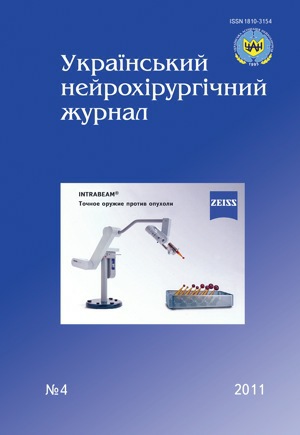Cognitive-affective syndromes in children with cerebellar tumor
DOI:
https://doi.org/10.25305/unj.57566Keywords:
cerebellum, tumors, neuropsychological tests, cognitive-affective syndromes, childrenAbstract
The results of clinical and neuropsychological investigation, provided among 36 children with cerebellar tumor, aged from 7 to 18 years are presented (tumor of vermis — in 11 cases, of left hemisphere — in 15, of right hemisphere — in 10).
Neuropsychological tests for minimal cerebral dysfunction and cognitive and psycho-emotional functions peculiarities revealing were used. In children with cerebellar tumor the cognitive-affective disorders have different structure and intensity (subclinical, abortive, neurotic, autistic, verbal and psychotic syndromes). Features of cognitive-affective disorders depend on disorders of cerebellar structures localization: hemispheres disorders usually was found at subclinical, abortive, neurotic and autistic syndromes; vermis damages — at neurotic, autistic, verbal and psychotic disturbances. Features of cognitive-affective disorders depending on lesion lateralization (left/right hemisphere of cerebellum) were identified.
For effective diagnostic of cognitive-affective disorders in children with cerebellar tumor, along with analysis of clinical manifestation, adequate use of neuropsychological tests is recommended.
References
Aarsen F.K. Long-term sequelae in children after cerebellar astrocytoma surgery / F.K. Aarsen, H.R. Van Dongen, P.F. Paquier // Neurology. — 2004. — N62. — P.1311–1316.
Когнитивные нарушения у больных с артериовенозными мальформациями, каверномами и гематомами мозжечка / С.Б. Буклина, С.Б. Яковлев, Е.Ю. Бухарин [и др.] // Журн. неврологии и психиатрии им. С.С. Корсакова. — 2009. — Т.109, №6. — С.15–23.
Daniel S.S.R. Visual disturbance associated with postoperative cerebellar mutism / S.S.R. Daniel, L.E. Moores, M.P. Di Fayio // Pediatr. Neurol. — 2005. — V.32, N2. — P.127–130.
Posttraumatic stress disorder and fMRI activation patterns of traumatic memory in patiens with borderline personality disorder / M. Driessen, T. Beblo, M. Mertens, M. Piefke // Biol. Psychiatry. — 2004. — V.55, N6. — P.603–611.
Fuentes C.T. “Motor cognition” — what is it and is the cerebellum involved? / C.T. Fuentes, A.I. Bastian // Cerebellum. — 2007. — V.6, N3. — P.232–236.
Gowen E. Behavioural aspects of cerebellar function in adults with Aspenger syndrome /E. Gowen, C. Miall // Cerebellum. — 2005. — V.4, N4. — P.279–289.
Hirsch J.F. Medulloblastoma in childhood. Survival and functional results / J.F. Hirsch, D. Renier, P. Czernichow // Acta Neurochir. — 1979. — N48. — P.1–15.
Ivry R.B. The neural representation of time / R.B. Ivry, R.M. Spencer // Curr. Opin. Neurobiol. — 2004. — V.14, N2. — P.225–232.
Kotil K. Cerebellar mutism following posterior fossa tumour resection in children / K. Kotil, M. Eras, M. Akcetin // Turk. Neurosurg. — 2008. — V.18, N1. — P.89–94.
Kusano Y. Transient cerebellar mutism caused by bilateral damage to the dentate nuclei after the second posterior fossa surgery. Case report / Y. Kusano, Y. Tanaka, H. Takasuna // J. Neurosurg. — 2006. — N104. — P.329–331.
Maeshima S. Stroke rehabilitation in a patient with cerebellar cognitive affective syndrome / S. Maeshima, A. Osawa // Brain Ini. — 2007. — V.28, N8. — P.877–883.
Marien P. The lateralized linguistic cerebellum: a review and a new hypothesis / P. Marien,S. Engelborghs, F. Fabbro // Brain Lang. — 2001. — N79. — P.580–600.
Miall R.C. Disruption of state estimation in the human lateral cerebellum / R.C. Miall, L.O. Christensen, O. Cain // Plo. Biol. — 2007. — V.5, N11. — P.316.
Орлов Ю.А. Послеоперационный мутизм при опухолях задней черепной ямки у детей / Ю.А. Орлов, С. Зентани // Вопр. нейрохирургии им. Н.Н. Бурденко. — 2001. — №1. — С.6–9.
Ozgur B.M. The pathophysiologic mechanism of cerebellar mutism / B.M. Ozgur, J. Berberian, H.E. Aryan // Surg. Neurol. — 2006. — N66. — P.18–25.
Riva D. The cerebellum contributes to higher functions during development. Evidence from a series of children surgically treated for posterior fossa tumours / D. Riva, C. Giorgi // Brain. — 2000. — V.123, N5. — P.1051–1061.
Schmahmann J.D. The neuropsychiatry of the cerebellum — insights from the clinic / J.D. Schmahmann, J.B. Weilburg, J.C. Sherman // Cerebellum. — 2007. — N6. — P.254–267.
Steinlin M. The cerebellum in cognitive processes: supporting studies in children / M. Steinlin // Cerebellum. — 2007. — V.6, N3. — P.237–241.
Timmann D. Cerebellar contributions to cognitive functions: a progress report after two decaders of research / D. Timmann, I. Daum // Cerebellum. — 2007. — V.6, N3. — P.159–162.
Turqut M. Cerebellar mutism / M. Turqut // J. Neurosurg. — 2008. — V.105, N6. — P.444–451.
Калашникова Л.А. Роль мозжечка в организации высших психических функций / Л.А. Калашникова // Журн. неврологии и психиатрии. — 2001. — №4. — C.55–60.
Тархан А.И. Нейропсихологическая диагностика минимальной мозговой дефицитарности у больных с зависимости / А.И. Тархан, Т.В. Гурвиц, Р.К. Питман // Усовершенствованная медицинская технология. — СПб.: ФГУ СПб, НИПНИ им. В.М. Бехтерева, 2008. — 60 с.
Lacusta V. Cerebelul i funciile cognitive / V. Lacusta. — Chiinu, Elena-V.I., 2010. — 219 p.
Зуева И.В. Нарушение когнитивных процессов при изолированных инфарктах мозжечка: дис. … канд. психол. наук / И.В. Зуева. — М., 2003. — 104 с.
Downloads
Published
How to Cite
Issue
Section
License
Copyright (c) 2011 Viktor Lacusta, Anatoliy Litovchenko

This work is licensed under a Creative Commons Attribution 4.0 International License.
Ukrainian Neurosurgical Journal abides by the CREATIVE COMMONS copyright rights and permissions for open access journals.
Authors, who are published in this Journal, agree to the following conditions:
1. The authors reserve the right to authorship of the work and pass the first publication right of this work to the Journal under the terms of Creative Commons Attribution License, which allows others to freely distribute the published research with the obligatory reference to the authors of the original work and the first publication of the work in this Journal.
2. The authors have the right to conclude separate supplement agreements that relate to non-exclusive work distribution in the form of which it has been published by the Journal (for example, to upload the work to the online storage of the Journal or publish it as part of a monograph), provided that the reference to the first publication of the work in this Journal is included.









